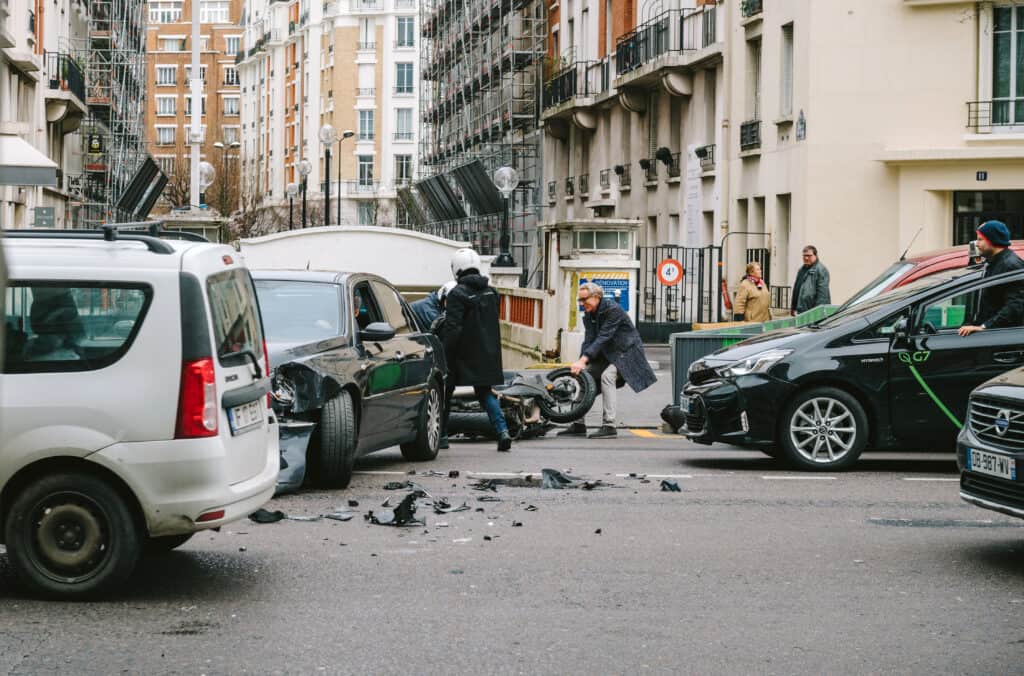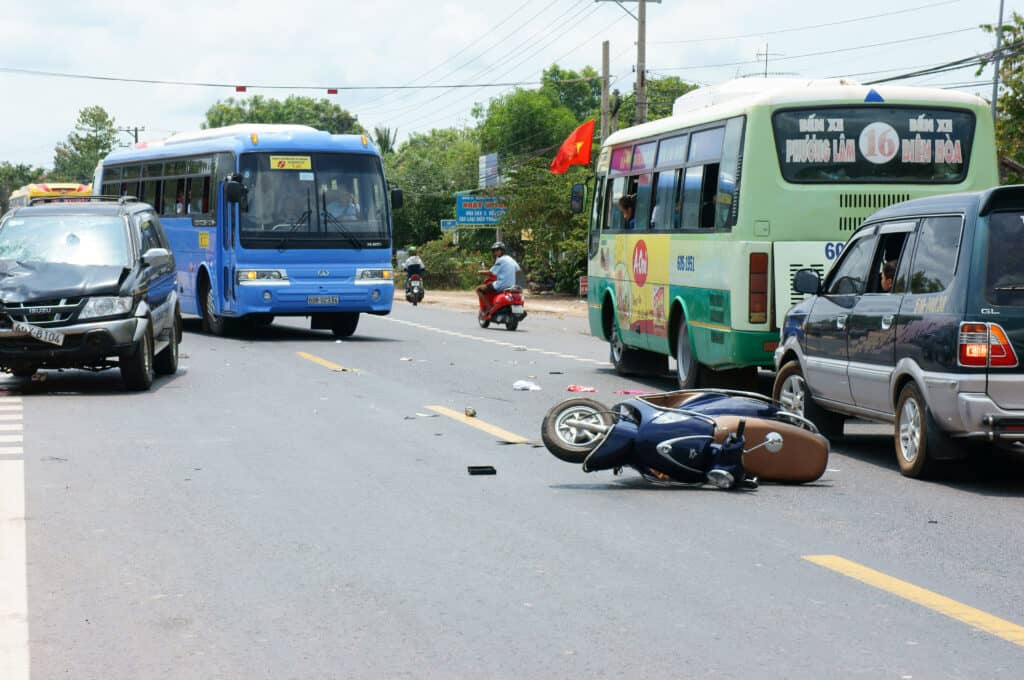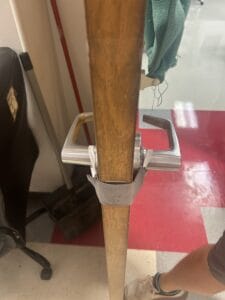Car accidents can happen to anyone, even while traveling. Being involved in an accident away from home can be a stressful and overwhelming experience. Knowing what steps to take in the immediate aftermath can help alleviate some of the anxiety and ensure the safety of all parties involved.
The first priority when faced with a car accident is assessing the safety and well-being of those involved. If you find yourself in this situation, turn on your hazard lights and, if possible, move your vehicle off the roadway to avoid any further hazards. It is essential to call the police and file a collision report, which will be useful in future insurance claims. Additionally, calmly exchanging information with the other driver is crucial for resolving the issue efficiently.
While traveling, it is imperative to inform your insurance company and, in the case of a rental car, the rental company. These initial steps will provide a solid foundation to navigate the accident’s aftermath, ensuring a swift and less taxing process for everyone involved.
Assess the Situation
When involved in a car accident while traveling, it is crucial to remain calm and assess the situation promptly. Before taking any action, ensure that you and any passengers are safe and have not sustained any injuries. If you or any passengers require medical attention, call an ambulance immediately and tend to any injuries with a first aid kit if available.
Once everyone in the vehicle is checked for injuries, turn on your hazard lights to alert other drivers of the accident. This will help increase safety for yourself, your passengers, and other road users. Additionally, remember that keeping a clear and focused mindset is essential for making informed decisions during an emergency.
After addressing immediate concerns regarding injuries, identify a safe spot to move your vehicle. If your car is still operational and it is safe to do so, maneuver it to a safe location away from the flow of traffic. Keep in mind, leaving your vehicle in the middle of the road can increase the risk of further accidents, so it is crucial to move your car with caution.
Now that your vehicle is in a safe spot, take a moment to further assess the situation. Observe the extent of damage to your vehicle and other vehicles involved in the accident, as well as any potential hazards in the immediate surroundings. Determine whether it is necessary to call the police or any additional emergency services based on the severity of the accident.
Throughout the entire process, remember to remain calm and prioritize safety for yourself and others. By doing so, you are effectively handling the situation and minimizing any potential risks associated with the car accident.
Exchange Information
When involved in a car accident while traveling, it is essential to exchange information with the other parties involved. This process allows for a smoother insurance claim process and ensures that all necessary documentation is available for legal purposes.
Begin by obtaining the other driver’s name, address, and phone number. Having their complete contact information will enable efficient communication throughout the process. In addition, make sure to collect the other driver’s license plate number as it helps in identifying the vehicle in case of any disputes or investigations.
It is also crucial to gather insurance information from the other driver, including their insurance company’s name and policy number. This data will be necessary when filing a claim and dealing with any related financial matters. To ensure accuracy, double-check these details against the other driver’s insurance card.
While exchanging information, take note of any witnesses at the scene and ask for their contact details as well. Their testimonies could prove valuable in case conflicting accounts arise regarding the accident.
Moreover, remember to document the accident scene by taking pictures of the vehicle’s positions, road conditions, and any visible damages. These photographs can serve as crucial evidence in insurance claims or legal proceedings.
In conclusion, exchanging information after a car accident is an essential step that ensures a smoother insurance claim process and reduces potential legal complications. By being thorough and attentive, you can help protect your interests and facilitate a quick resolution.
Document the Scene
When involved in a car accident while traveling, it’s crucial to document the scene thoroughly to gather essential evidence. Take the time to speak with any witnesses at the accident scene, as their statements can be helpful later on. Collect their contact information, including names, phone numbers, and addresses, to ensure you can reach them when necessary.
Taking pictures of the accident scene is vital for capturing important visual evidence. This includes not just photos of the vehicles involved, but also the surrounding environment, any traffic signals, and road conditions. Pictures should be taken from various angles, and close-ups should be captured for any specific damages to the cars. Additionally, if any physical injuries have been sustained, take photos of those too.
Apart from visual evidence, taking comprehensive notes as soon as possible can help you recall critical details later. These notes should cover the sequence of events leading up to the accident, as well as any relevant observations and assumptions made by involved parties.
When exchanging information with the other driver or drivers, ensure you document the necessary details such as names, addresses, phone numbers, driver’s license numbers, vehicle registration details, and insurance information. It’s also prudent to note the police department’s jurisdiction and the responding officer’s name to help with obtaining a police report later, if required.
Having a well-documented scene, including witness statements, accurate notes, and a complete collection of relevant pictures, will provide strong evidence to support any claims and help resolve the matter more efficiently.
Contact Authorities
When involved in a car accident while traveling, it is essential to contact the local authorities as soon as possible. Remain calm, and take the necessary steps to notify the appropriate law enforcement agency in the area where the accident took place.
Immediately following the accident, assess the situation and determine if any injuries have occurred. If there are injuries or a potential threat to the safety of those involved, call 911 for emergency assistance. The emergency response team will address the medical needs and dispatch the appropriate law enforcement officers to the scene.
Upon the arrival of law enforcement, they will assess the situation and prepare an accident report, which is pivotal for insurance claims and legal purposes. It is essential to cooperate with the police officers and provide accurate information about the incident. Provide details such as the location, time, weather conditions, and any other relevant factors that contributed to the accident.
In cases where the police are unable to respond to the accident—for instance, due to resource constraints—it is crucial that the involved parties file a crash report with the nearest law enforcement agency. This report should be filed within a few days of the accident, as some jurisdictions have specific deadlines for crash report submissions.
Throughout the process, remain confident and knowledgeable about your situation and rights. Keep a clear and neutral tone while conversing with the authorities, ensuring that the information provided is accurate and concise. By following these steps, you will have fulfilled your legal obligations and created a solid foundation for any insurance claims or legal action that may follow the incident.
Notify Your Insurance
In the event of a car accident while traveling, it’s essential to notify your insurance company as soon as possible. Promptly informing your insurance company helps expedite the claims process and can potentially result in a favorable outcome. Your insurance agent will guide you through the necessary steps and provide assistance throughout the claims process.
Begin by contacting your insurance company as soon as it’s safe to do so. Provide them with accurate details of the accident, including the location, nature of the incident, and any relevant information about the other party involved. Remember to be honest and thorough, as any discrepancies or missing information may affect the outcome of your car insurance claim.
To facilitate the auto insurance claim, gather necessary documentation such as photographs of the accident scene and damage, a copy of the police report, and any medical records if injuries were sustained. Keep in touch with your insurance company and be prepared to provide any additional information they may request.
During the claims process, your insurance company will typically assess the damage, investigate the incident, and determine liability. They may also arrange for vehicle repairs, rental cars, and other required services. Stay in close communication with your insurance agent, and promptly address any questions or concerns that arise.
It’s essential to understand the coverage your car insurance policy provides, as this will directly affect the claims process. Familiarize yourself with your policy’s terms and conditions, including any deductible amounts, coverage limits, and exclusions. This knowledge will help you make informed decisions and navigate the claims process with confidence.
In conclusion, swiftly notifying your insurance company, providing accurate information, being proactive throughout the process, and understanding your policy will help ensure a smooth and efficient insurance claim experience.
Seek Medical Attention

When involved in a car accident while traveling, it is crucial to seek medical attention immediately if anyone is hurt. Assess each person’s condition, including your own, and call 911 if necessary to summon medical help. Even if injuries appear to be minor, it’s still essential to consult a doctor or other healthcare professional for a thorough evaluation.
It’s also a good idea to take pictures of any bruises, cuts, scrapes, or other visible injuries to visually document the aftermath of the accident. In addition to visual records, keep track of pain levels and any other symptoms that arise, as this information may be crucial for any medical or legal processes that follow the car accident.
When visiting a healthcare professional, make sure to provide them with accurate and comprehensive medical information. This could include allergies, pre-existing conditions, and a list of current medications that you or anyone involved in the accident might be taking. Be honest about the details of the crash, as this can help the healthcare provider better assess the severity of injuries and prescribe the appropriate treatment plan.
In some cases, medical bills stemming from car accident injuries can be substantial. It’s essential to keep track of all invoices and payments related to medical appointments, treatments, and medication. Organizing this information can help you effectively manage your medical bills and ensure that you receive the necessary financial compensation from your insurance provider or the responsible party.
By prioritizing medical attention after a car accident while traveling, you can better ensure the health and well-being of everyone involved. It’s essential not to delay seeking medical care, as some injuries may not be immediately apparent. Remember that your personal safety and the safety of those around you should always come first in any car accident situation.
Protect Your Interests
When involved in a car accident while traveling, protecting your interests is crucial. It starts with understanding whether you are at fault or not. Determining the at-fault driver is essential, as it affects insurance claims, liability, and any potential lawsuits.
After a collision, the first step to protect yourself is to report the accident immediately. Calling the police to the scene will allow them to assess the situation and document the incident. Having a police report strengthens your case when discussing matters with insurance companies and even your lawyer if needed.
Always exchange information with the other driver, including vehicle registration, insurance details, and contact information. This data will be valuable in case of any property damage or personal injury claims. Additionally, take photographs of the scene and damages to help with insurance claims, and document your version of what occurred.
If the at-fault driver is uncooperative, consider speaking with an attorney who specializes in car accident cases. A knowledgeable lawyer can offer guidance on navigating the legal system and dealing with insurance companies. Besides, having legal representation ensures adequate compensation for expenses, losses, and any other unforeseen consequences arising from the accident.
It’s also essential to notify your insurance company about the incident while keeping records of all communication throughout the process. Timely reporting helps avoid any complications and assists in dealing with insurance claims more effectively.
Moreover, prioritize the well-being of your companions during the whole process. Ensuring their medical needs are addressed promptly, and any concerns are communicated to relevant authorities is essential.
And finally, never engage in road rage, as it can escalate the situation and lead to further legal consequences. Maintain a calm and clear mindset while handling the accident.
By taking these precautionary measures, you can protect your interests in case of a car accident while traveling, ensuring a smooth resolution and appropriate compensation for losses.
Aftermath of the Accident
When dealing with the aftermath of an accident while traveling, there are several steps to ensure everyone’s safety and navigate the complicated process efficiently. First and foremost, determine whether anyone is hurt and immediately call for emergency assistance if necessary. It is critical to prioritize the well-being of all involved individuals before handling any administrative matters.
Once everyone’s safety has been assessed, assess the situation and move the vehicles off the road if possible, turning on hazard lights and setting up reflective cones if available. In bad weather or poor visibility, utilize any available roadside assistance services to help secure the scene. Renters of a rental car should contact the rental company as soon as possible to report the incident and receive further instructions.
In the event a vehicle requires towing or additional assistance, contact a tow truck from a reputable service provider. Make sure to notify your insurance company at the earliest convenience, as some policies include emergency assistance coverage that may help with the costs incurred.
Collecting information is crucial in the aftermath of an accident. Take photos of the damage and surrounding area, and gather information from other drivers and witnesses. Often, insurance companies offer remote inspection tools that allow policyholders to submit photos and details directly through a smartphone app, speeding up the claims process.
Depending on the circumstances of the accident, drivers may encounter situations involving insured, uninsured, or underinsured motorists. It is essential to know the specific coverages in your insurance policy to protect yourself from potential financial risks. The claims process will also involve determining the actual cash value of the vehicle, which represents the market value of the car, minus depreciation. Depending on the outcome, policyholders may need to pay a deductible before any repair or replacement costs are covered by their provider.
In summary, addressing the aftermath of an accident while traveling requires careful attention to safety, documentation, and communication with relevant parties, such as rental companies, tow truck providers, and insurance companies. By following these steps, individuals can feel confident that they are taking the appropriate actions towards a smooth resolution.
Dealing with Insurance Coverage
When involved in a car accident while traveling, it’s essential to address insurance coverage promptly. The first step is to gather information from all parties involved, including other drivers, witnesses, and law enforcement officers. Collect details like license plates, contact information, and insurance policy numbers to facilitate starting the claims process.
Immediately report the accident to your insurance provider. They will guide you through the process and assign an adjuster to evaluate the damages. The adjuster will estimate the repair costs and determine fault in the accident, which is crucial for processing the claim.
It’s important to understand your insurance coverage before an accident happens. Familiarize yourself with different aspects such as accident forgiveness, which might prevent your rates from increasing after a collision. Keep in mind that different providers have varying policies, and your rates may go up depending on the circumstances.
In some cases, involving an attorney can be beneficial when dealing with car accident claims. They can help you navigate the complex legal process, especially when facing disputes about fault or encountering issues with underinsured drivers.
Comprehensive coverage can provide added protection against a range of losses, including weather-related damages, theft, and vandalism. This type of coverage is recommended for travelers to ensure their vehicle is protected in various situations.
Lastly, remember that efficient communication with the insurance provider is vital throughout the claims process. Stay up-to-date with your claim’s progress, provide necessary documentation, and ask any questions to ensure a smooth resolution.
Frequently Asked Questions
How do you handle a car accident in a foreign country?
When involved in a car accident in a foreign country, remain calm and check for injuries. Familiarize yourself with local laws and the emergency number to call. Contact your rental car agency and insurance company as soon as possible. Document the scene and collect necessary information, such as the other driver’s personal and insurance details.
What steps should be taken after a minor car accident while on vacation?
After a minor car accident on vacation, ensure everyone is safe, and move vehicles to a secure location if possible. Exchange insurance and contact information with the other driver(s). Document the scene by taking photographs. Notify the police if necessary, according to local laws. Inform your insurance provider and rental car company about the incident.
When should you call the police after an accident during your trip?
Call the police immediately after an accident if anyone is injured or the vehicles are severely damaged. Even for minor accidents, it may be required to involve the police depending on the laws of the country you are in. Always research local traffic rules and regulations prior to embarking on your trip.
How long do you have to report a car accident to insurance when traveling?
Timeframes for reporting car accidents to your insurance company may vary. It is ideal to inform them as soon as possible following the accident. Review your insurance policy or contact your insurer to determine the specific requirements and deadlines for reporting accidents while traveling abroad.
What important information should be exchanged after a crash?
After a crash, exchange relevant information such as full name, contact details, insurance provider, policy number, driver’s license number, vehicle registration, and description of the vehicles involved. If there are witnesses, request their contact details as well. Document the exact location, time, and date of the accident.
What are key tips on filing insurance claims after a travel-related accident?
To file insurance claims after a travel-related accident, provide your insurance company with accurate and comprehensive documentation, including photographs, witness statements, and police reports if available. Retain receipts for any expenses related to the accident, such as medical treatments or repairs. Cooperate with your insurer throughout the process and follow their guidelines to ensure a timely and smooth claim resolution.








